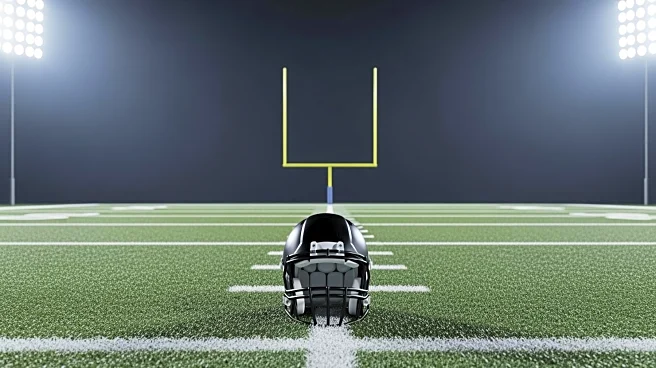What's Happening?
Marshawn Kneeland, a defensive end for the Dallas Cowboys, passed away at the age of 24, just days after a significant moment in his NFL career. During a 'Monday Night Football' game against the Arizona
Cardinals, Kneeland recovered a blocked punt for a touchdown, marking a highlight in his career. Despite his efforts, the Cowboys lost the game 27-17. Kneeland was drafted in the second round of the 2024 NFL Draft from Western Michigan and had played in 11 games during his rookie season and seven games this year, recording six solo tackles and one sack. The Cowboys announced his death, expressing condolences to his girlfriend Catalina and his family. The NFL also released a statement mourning his loss and offering support to his loved ones.
Why It's Important?
The sudden death of Marshawn Kneeland is a significant loss for the Dallas Cowboys and the NFL community. Kneeland was a promising young player whose career was on the rise, as evidenced by his recent performance. His passing not only affects his team but also highlights the unpredictable nature of life and the impact of such tragedies on sports organizations. The Cowboys and the NFL have expressed their sorrow and are providing support to those affected, underscoring the importance of mental health and counseling resources in professional sports. Kneeland's death may prompt discussions on player welfare and the pressures faced by athletes.
What's Next?
The Dallas Cowboys and the NFL are likely to continue offering support and counseling to Kneeland's family, teammates, and friends. The team may hold a tribute or memorial in his honor during upcoming games. Additionally, the cause of Kneeland's death has not been disclosed, which may lead to further inquiries or investigations. The NFL community may also engage in broader conversations about player health and safety, potentially influencing future policies or support systems for athletes.
Beyond the Headlines
Kneeland's death could have deeper implications for the NFL, particularly in terms of player support and mental health awareness. It may lead to increased scrutiny on how teams handle the emotional and psychological well-being of their players. The tragedy might also spark discussions on the pressures faced by young athletes and the need for comprehensive support systems within sports organizations. This event could serve as a catalyst for change in how the NFL addresses these issues.










